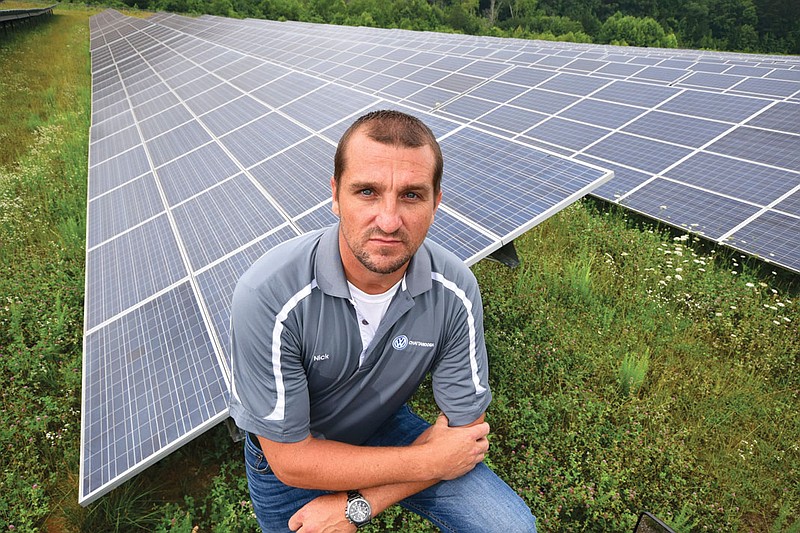SOLAR JOBS HEATING UP
* Between 2012 and 2017, solar employment grew by 110 percent overall or 16 percent annually, adding 131,000 jobs. Within this period, solar employment grew nine times faster than the overall U.S. economy, and one in every 100 new jobs was a solar job.* But, sectors such as installation, sales and distribution, and project development lost about 7,500 jobs in 2017, while the manufacturing sector lost about 1,200 jobs. Still, the long-term trend continues to show growth. The solar workforce grew by 168 percent in the past seven years from about 93,000 jobs in 2010 to over 250,000 jobs in 2017.* Solar makes up just under 2 percent of overall U.S. energy generation, yet it employs twice as many workers as the coal industry, almost five times as many as nuclear power, and nearly as many workers as the natural gas industry, based on 2016 data.* Women made up 27 percent of the solar workforce in 2017, down 1 percent from 2016. Veterans made up 9 percent of solar workers, which is 2 percent more than the overall U.S. workforce.Source: The Solar Foundation
So-called "green" jobs are generating a swirl of interest in the marketplace, and a pair of Southeast Tennessee community colleges say they're filling pressing needs in the environmental sector.
One of the fastest-growing offerings at Cleveland State Community College is the Forestry, Wildlife and Fisheries program, according to associate professor Robert Brewer.
"The program is growing by leaps and bounds," says Brewer, who's also coordinator of the Greg A. Vital Center for Natural Resources and Conservation at Cleveland State.
Meanwhile, at Chattanooga State Community College, a surge of public interest in solar energy has businesses and other entities offering more internships than the college can fill, says Tracie Clifford, interim head of engineering systems technology.
"The millennials are interested in looking at power in a green way," says Clifford, who also serves as director of the Wacker Institute. That Chattanooga State entity helps provide workers for Wacker's sprawling plant in Charleston, Tenn., that makes polysilicon used in solar power panel production.
Brewer says Cleveland State has the only two-year community college Forestry, Wildlife and Fisheries program in Tennessee.
"I've had students from Martin and Knoxville," he says, though most are from Southeast Tennessee.
One unique aspect of the program is that it engages students in research, which isn't typically undertaken in community colleges, Brewer says.
"It increases learning and engages students a lot more," he says. "It makes them competitive when going to a four-year school and gives them experience to get a job."
Last year, Cleveland State announced the creation of the Greg A. Vital Center, named after the chief executive officer of Independent Healthcare Properties, a Chattanooga-based company he co-founded in 1996. The company owns Morning Pointe assisted living facilities and The Lantern Alzheimer's memory care centers in five Southeastern states.
Brewer says Vital sits on several conservation boards, liked what he saw at Cleveland State and donated $250,000 to the program. It was the college's first named academic program.
"He has a strong interest in conservation and natural resources," Brewer says.
At Chattanooga State, students who graduate from its Solar Energy Technology program can earn an associate in applied science degree. Also, they can sit for gaining national certification in the field, says Clifford.
Students can land careers in the solar power industry in research and development, materials manufacturing, plant construction and operation along with installation and maintenance.
INTO THE WILD
* 101.6 million Americans, or 40 percent of the U.S. population 16 years old and older, participated in wildlife-related activities in 2016, such as hunting, fishing, and wildlife-watching.* Participants spent $156 billion — the most in the last 25 years in 2016, adjusted for inflation.* Wildlife-watching , observing and photographing wildlife, surged 20 percent from 2011 to 2016, from 71.8 million to 86 million participants.* Since 2011, there has been an 8 percent increase in angling participation from 33.1 million anglers to 35.8 million in 2016.* Hunting participation dropped by about 2 million participants to 11.5 million hunters. Total expenditures by hunters declined 29 percent from 2011 to 2016 from $36.3 billion to $25.6 billion.Source: U.S. Department of the Interior
VW SOLAR FARM
* Biggest in Tennessee* Started generating power in 2012* 65 acres adjacent to VW plant* 33,600 solar panels* Supplies power to entire VW plant during nonproduction times* Supplies 12.5 percent of plant power during productionSource: Volkswagen
The national mean wage is $59,000 a year for those who work in the sector for public utilities, engineering consultants, energy management firms, system manufacturers or for heating and cooling contractors, according to the college.
Tennessee's mean wage is $53,000, Clifford says.
"We'd like to have more people in the program," she says. "It's a good market for students."
Clifford says that serving in internships often gives students hands-on experience in putting in or replacing systems.
"A lot of contractors do work for EPB," she says as they learn how a renewable energy source ties into a large grid.
About a quarter of program graduates go into business for themselves, Clifford says.
"They're doing really well," she says.
Brewer says graduates from the Forestry, Wildlife and Fisheries program can go to work as wildlife officers or managers in states, for the U.S. Forestry Service or into private consulting practices.
Wildlife officers can earn more than $30,000 a year with a two-year degree, he says. Many graduates of the Cleveland State program go onto a four-year school and can obtain even higher-paying jobs, Brewer says.
The program is attractive for Tennessee Promise students, he says. Tennessee Promise provides two years of tuition-free attendance at a community college.
"It's the only place in the state where you get two years free to pursue this degree," Brewer says.
Clifford said the Solar Energy Technology program works with Tennessee Promise and Tennessee Reconnect students. The Tennessee Reconnect scholarship enables adults to earn an associate degree or technical certificate tuition-free.
Contact Mike Pare at mpare@timesfreepress.com or 423-757-6318. Follow him on Twitter @MikePareTFP.

